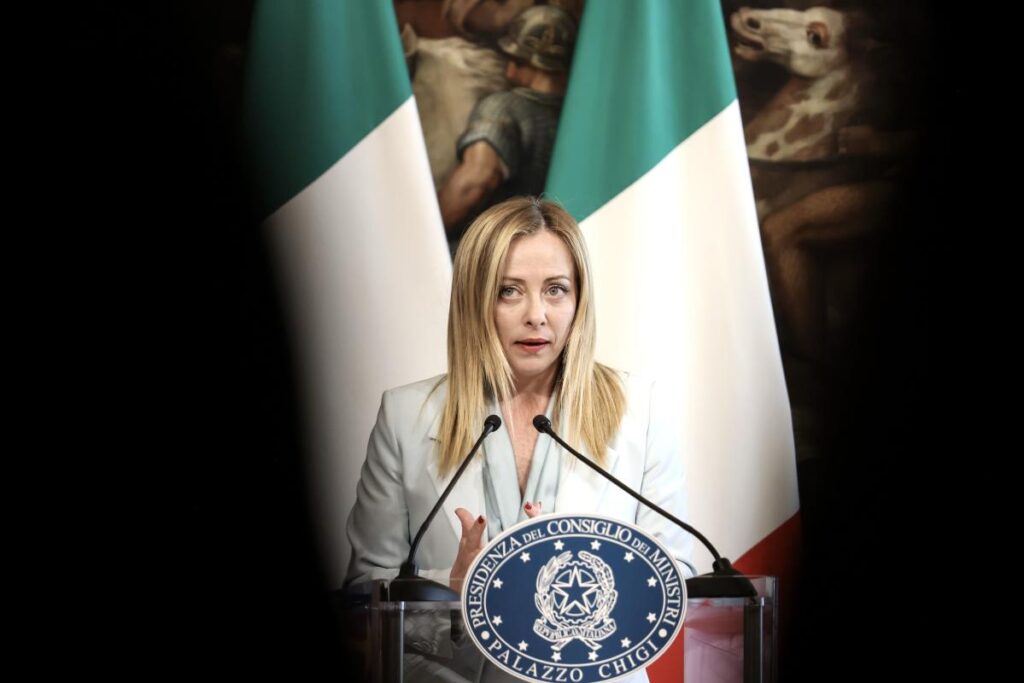(Bloomberg) — Prime Minister Giorgia Meloni’s office is calling on Italy’s banks and insurers to help finance the budget, under a new plan designed to deliver on giveaways promised to voters.
Most read from Bloomberg
“As we promised, there will be no new taxes for citizens,” Meloni said in a post on X on Tuesday. “3.5 billion euros from banks and insurance companies will be allocated to healthcare and the most vulnerable.”
She did not specify how that money would be collected or within what time frame. The Finance Ministry confirmed that the financial sector will help cover expenses, but did not provide details. Finance Minister Giancarlo Giorgetti will hold a press conference in Rome on Wednesday at 11 a.m.
Ministers agreed on the budget late on Tuesday, just in time to meet the deadline for submitting the plan for scrutiny by the European Union. The measures still have to be submitted to parliament for signature.
The outcome, in a package with a gross value of €30 billion ($33 billion) for 2025, ends weeks in which the government has struggled with how to reconcile a vow to accelerate Italy’s deficits with the political need to cut expensive fulfill election promises.
These commitments include reducing the tax wedge – the difference between what workers cost employers and what they are paid – and aid to low-income households and small businesses.
The government is also boosting defense and health care spending.
The announcement crystallizes a goal of Giorgetti – a League member, a junior partner in the governing coalition – to create a budget that reaps “sacrifices from all,” helping all parts of society, as he puts it month described in an interview with Bloomberg.
League chief Matteo Salvini, who is also deputy prime minister, called the hit on banks and insurers a “victory” on his part, according to a report on X.
By tapping banks, Giorgetti is revising a previous goal of the government, which has repeatedly singled them out for profiting excessively from a high interest rate environment.
In the first half of the year, profits at Italy’s largest lender, Intesa Sanpaolo SpA, rose by 13% compared to a year earlier. At UniCredit SpA, its second largest rival, prices rose by about 20%.
However, previous attempts to tax banks have not worked. Last year, an unexpected proposal to do so flopped after a major sell-off in Italian shares. Giorgetti vowed that this mistake would not be repeated, and the Italian Banks Association has been working with government officials in recent weeks on a solution to limit its possible impact.
Giorgetti is also raising more money by cutting government spending.
The need to improve Italy’s finances has become more urgent since the country was placed under a special monitoring regime by Brussels officials for deficits well above the EU limit of 3% of output.
In an effort to rebuild the budget’s credibility, Giorgetti accelerated the timetable for doing so, promising to bring deficits below that ceiling by 2026 and to start reducing the massive debt burden a year later.
So far, in contrast to the investor alarm surrounding France in recent weeks, Italy has managed to reassure financial markets. The spread between Italy’s 10-year government bonds and Germany’s – a key risk measure in the region – reached 124 basis points on Tuesday, the lowest since March.
(Updates with Treasury statement starting in third paragraph)
Most read from Bloomberg Businessweek
©2024 BloombergLP

